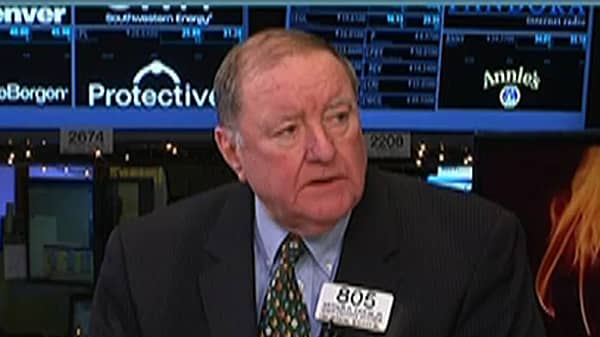What's so troubling about this is that it reveals the president has a very poor understanding of the way our economy works. Paul Krugman does an excellent job of explaining what's wrong with this interest-rate-spike narrative here. But the short version is just this: if we do go off the fiscal cliff and the economy contracts, it's far more likely that interest rates will fall in response, because investors will dump risk assets for the safest and most liquid assets in the world, namely the bonds issued by the government of the United States.
This entire discussion is a repeat of the debate that preceded America's post-deficit-ceiling credit-rating downgrade. The widespread assumption was that a downgrade would lead almost immediately to a sell-off of Treasury bonds. Prior to the downgrade, I predicted that exactly the opposite would happen—everything else would sell off and Treasurys would rally.
It's very likely that a downgrade of the credit rating of the U.S. would trigger a sell-off, but it's far from clear that investors would sell U.S. government debt. More likely the investors would sell risk assets—equities, high-yield corporate bonds, mortgage securities—and actually buy U.S. government debt.
(Read more:
A Downgrade of US Debt Won't Matter as Much as You Think
)
That was precisely what happened.
(Now take a look at my longer explanation of the phenomenon after the event: Why Did Treasury Bonds Rally?)
Another way of thinking about the matter is this: If no deal on the fiscal cliff is reached, the big danger will be an economic contraction resulting from lower spending and higher taxes. Another recession—or even a near brush with one—will likely push out the date that the Federal Reserve raises short term interest rates. And since long term rates reflect the expected path of short-term rates, any increased chances of a slumping economy keep down interest rates.
Unfortunately,Obama seems to not have learned very much from the debt ceiling and downgrade incident. He still imagines that signs of political dysfunction will result in higher interest rates, that the bond vigilantes will come galloping out of the shadows and string our interest rates up to the sky.
Notice that I say that Obama "still" believes this. Because even though Krugman and Matt Ygelsias would like to believe the president is smarter about economics than he is—both note their doubts about the accuracy of the Wall Street Journal story—it's pretty clear that Obama has long believed in the bond vigilantes.
This is evident throughout Noam Scheiber's book, "The Escape Artists," which tells the tale of the Obama administration's economic team from 2009 through fall of 2011. In May of 2009, for example, Obama asked Peter Orzag—a well-known deficit scold—to draft a secret memo "laying out the government's options in the event of a fiscal crisis, in which a runaway deficit sent interest rates spiraling ever upward." That's not the sort of memo you ask someone to draft, unless you are already a deep believer in the mythological bond vigilantes.
Justas Ebeneezer Scrooge was haunted by the ghost of his former partner, Obama seems to be haunted by the ghost of Orszag. Obama's comments to Boehner sound like something cribbed from this 2010 Orszag column in The New York Times.
A benign bond market, however, is a luxury we won't enjoy forever if we fail to tackle our long-term fiscal problem. What's more, losing the confidence of the bond market could prove painful, since it is widely known that our fiscal trajectory is unsustainable and market sentiment may therefore shift quickly and unpredictably. In any case, as the economy recovers, the dominant problem will move from depressed demand to excessive budget deficits.
Is there really much room for doubt that this is the sort of thing that was running through Obama's mind while he talked to Boehner?
I understand that it would be nice if the president didn't believe such things. But all the evidence points to the opposite conclusion. This isn't a reason for total despair, however. A great many people have changed their minds about how the bond market works. Perhaps one day, the president will, too.





